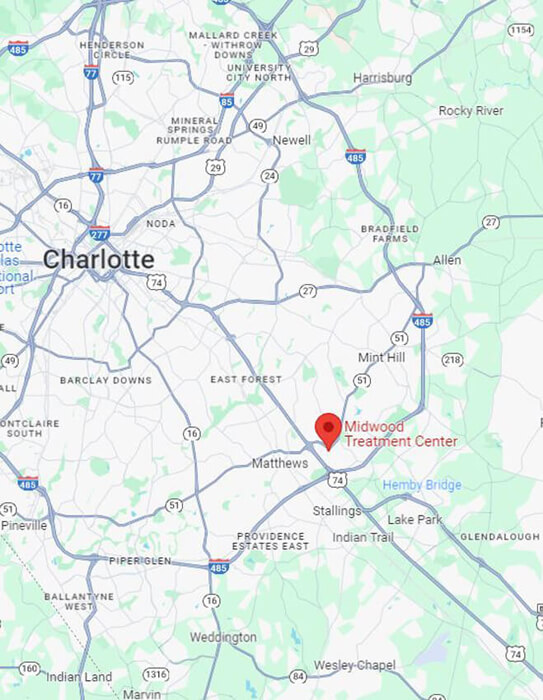An effective rehabilitation treatment program makes a significant difference in your life. A substance use disorder or mental health condition can cost you relationships, finances, and your freedom. If you feel like you don’t know yourself and need help, turn to Midwood Addiction Treatment Center in Charlotte, North Carolina, for the support, treatment, and care you deserve.
What Is a Rehab Center?
A rehabilitation center is a facility that provides inpatient and/or outpatient care to individuals who require substance use disorder or mental health condition treatment. These are specialized facilities that are staffed by mental health professionals who are experts in alcohol or drug addiction treatment and a variety of mental health conditions.
In many instances, people who have a substance use disorder may also have a co-occurring mental health condition. The most common mental health conditions to coincide with a substance use disorder include depression, anxiety, and eating disorders. When a person has both a substance use disorder and mental health condition, it’s called a dual diagnosis.

Midwood Addiction Treatment Center
Contact us to schedule a free assessment.
How Much Does Rehab Cost Without Insurance?
The cost of rehabilitation without insurance depends on several factors. The first is the cost of the rehab center. This varies depending on geographical location and the intensity of the customized treatment plan required for your recovery. However, your out-of-pocket costs are also influenced by how much financial aid or help you can get.
If you don’t have insurance, you may qualify for a government-sponsored insurance program such as Medicaid or Medicare. The financial counselors at Midwood Alcohol and Drug Addiction Treatment Center can also guide you through finding grants and scholarships to help pay for rehab treatment and how to apply for a loan or seek additional funding. Your out-of-pocket costs for rehab are typically less than the ongoing costs of substance abuse or the loss of a job and productivity that can be related to mental health conditions.

Rehab Center in North Carolina That Offers Payment Plans
Rehab treatment costs in North Carolina are also influenced by treatment centers that offer payment options or payment plans. Midwood Drug and Alcohol Addiction Treatment Center is part of Harmony Healing Center and accepts most major insurance plans. We offer payment options for your out-of-pocket expenses.
The mental health professionals at Midwood Addiction Treatment Center in North Carolina are here to help you get your life back on track. By receiving the treatment you need, you can create a healthier lifestyle.
Midwood Addiction Treatment Center
3057 Senna Drive
Matthews, NC 28105
Phone: 888-399-7556
Website: Midwood Drug and Alcohol Addiction Treatment Center
Average Cost of Medical Detox in North Carolina
The average cost of medical detox in North Carolina varies depending on the substance and the intensity of your addiction. Medically managed detoxification helps you achieve withdrawal while monitoring for potentially life-threatening side effects that can occur. The least expensive outpatient medical detoxification program costs roughly $1,750.
However, most individuals require inpatient or residential care for 24-hour monitoring to ensure they do not experience a life-threatening adverse event. The least expensive inpatient rehab cost is roughly $6,000 per month. Medically managed detoxification is the beginning of your recovery journey. Depending on your unique needs, you may complete your recovery in a residential or outpatient program.
Average Cost of Intensive Outpatient Program in NC
An intensive outpatient program in North Carolina offers individuals the help they need. Intensive outpatient programs typically offer therapy sessions several days per week for several hours each day. This is less than a partial hospitalization program but meets the needs of those who require more than once-a-week therapy to achieve their goals.
Therefore, the average intensive outpatient program (IOP) cost will vary depending on the number of therapy sessions required in your customized treatment plan. Our admission counselors can estimate your out-of-pocket costs when you call Midwood Drug and Alcohol Addiction Treatment Center at (888) 399-7556.
Average Cost of Partial Hospitalization Program in NC
A partial hospitalization program is an intense, highly structured outpatient program that offers individuals the therapeutic interventions they need to achieve sobriety. The average partial hospitalization program (PHP) cost in North Carolina varies depending on several factors. The first is the intensity of your customized program.
This cost is influenced by geographical location, the number of daily and weekly treatment sessions, and any additional intervention that may be required. Call Midwood Substance Addiction Treatment Center at (888) 399-7556 and speak with one of our admission counselors to estimate your out-of-pocket costs for a partial hospitalization program. They can also help verify insurance coverage.
Average Cost of Mental Health Treatment in NC
Treatment for mental health conditions is essential for recovery and enables you to successfully function within your circle of friends and family, as well as at work. The cost of mental health treatment varies significantly based on your condition, the length of treatment required, and the intensity of the treatment necessary to help you achieve recovery.
The mental health professionals at Midwood Addiction Treatment Center in North Carolina are focused on helping you achieve better mental health through a variety of behavioral health therapies, support groups, and a strong relapse prevention program. Our therapists integrate cognitive behavioral therapy, motivational interviewing, and other evidence-based, holistic approaches to treatment. Call Midwood Substance Addiction Treatment Center to speak with one of our admission counselors to estimate your treatment costs.
Average Cost of Dual Diagnosis Treatment in NC
Dual diagnosis is not a medical or mental health diagnosis but rather the description of a condition in which you simultaneously experience a substance abuse disorder and mental health condition. Treatment for a dual diagnosis is far more complex than treating a substance use disorder or mental health condition alone.
This impacts the average therapy costs and counseling fees. Medical bills for rehab can feel overwhelming. Call our admission counselors at Midwood Drug and Alcohol Addiction Treatment Center for an estimate of your out-of-pocket costs for rehab, an explanation of insurance coverage for rehab, and information about our payment plans.
How Much Does Long-Term Addiction Treatment Cost?
Long-term addiction treatment costs are greater than a typical 30-day short-term rehab stay. On average, an individual in a residential rehab program in North Carolina can expect to pay roughly $56,750. However, that cost is significantly influenced by insurance coverage, length of treatment, location of treatment, and intensity of the program.
For a better estimation of your out-of-pocket cost for long-term addiction treatment, call Midwood Alcohol and Drug Addiction Treatment Center and speak with one of our admission counselors. They can explain treatment expenses, rehabilitation charges, and any inpatient or outpatient rehab expenses that may be included in your treatment plan.


How Much Does Short-Term Addiction Treatment Cost?
A short-term addiction treatment is typically a 30-day rehab stay or less. Short-term addiction treatment also typically costs less than a long-term residential or inpatient rehabilitation stay. Within a short-term rehabilitation stay, you may incur detoxification expenses or medication-assisted treatment (MAT) costs. Addiction treatment pricing is typically based on your personalized program.
When you call Midwood Drug and Alcohol Addiction Treatment Center at (888) 399-7556, our admission counselors can discuss your estimated out-of-pocket rehab costs, verify insurance, and determine if prior authorization is required before treatment can begin.
Is Investing in Drug and Alcohol Rehab Worth It?
There are significant benefits to investing in your drug and alcohol rehabilitation. In the long term, the cost of alcohol or drugs far exceeds the cost of rehabilitation. However, there are additional long-term benefits that go well beyond your finances. For example, individuals with drug and alcohol addiction have a higher risk of being incarcerated and losing their freedom.
A jail or prison sentence follows you for the rest of your life and impacts your ability to find employment and housing. Drug and alcohol addiction also negatively influences relationships with friends and family. One study from the National Center for Biotechnology reports that 34.6% of people who were divorced cited substance abuse as a factor, and 12.1% said it was the final straw.
Does Insurance Pay For Addiction Treatment?
Yes, most health insurance plans, including government-sponsored plans like Medicaid and Medicare, will pay for addiction treatment. In 2010, the Affordable Care Act mandated that all health insurance plans offer treatment for essential health services. They define essential health services as mental health conditions and substance use disorders.
Additionally, the Mental Health Parity and Addiction Equity Act ensures that plans provide benefits similar to those for medical and surgical care. However, while these services are mandated, every policy is different. To fully understand your insurance policy benefits and limitations and how to receive your full benefits and right to care, call the admission counselors at Midwood Addiction Treatment Center or contact us online to learn more about how we guide your recovery journey and restore your life.
How To Pay For Rehab Treatment If You Don’t Have Insurance
If you don’t have health insurance, there are several ways to pay for rehabilitation treatment. Your first step is to call Midwood Drug and Alcohol Addiction Treatment Center at (888) 399-7556. Our admission counselor can speak with you about payment options through the treatment center and guide you in seeking additional financial help.
If you don’t have health insurance, you may qualify for a government-sponsored insurance plan, which will help cover the cost of rehab treatment. If you don’t qualify, you might consider a personal loan to cover rehabilitation charges or apply for community-based grants and scholarships that may help cover residential treatment costs and outpatient rehab expenses. Crowdfunding is an option, as is requesting a personal loan from friends and family.
Addiction and Mental Health Statistics in North Carolina (NC)
- According to the National Alliance on Mental Illness, more than three times the population of Raleigh (1.469 million) adults in North Carolina have a mental illness.
- In February 2021, 44.7% of adults in North Carolina reported symptoms of depression and anxiety. According to KFF, this number dropped in 2023 to 24.9% as compared to 32.3% of adults in the U.S.
- People needing mental health care are over seven times more likely to be forced out of work than those needing primary health care.
- According to the North Carolina Department of Health and Human Services, the rate of drug overdose deaths in 2020 rose by 40%. During the year, an average of nine people died each day of a drug overdose. The number of deaths rose again in 2021, another 22%.
- In 2021, the number of opioid deaths in North Carolina accounted for 84% of all drug overdose deaths in the state and accounted for 75% of all drug overdose deaths across the country.
- Roughly 46% of residents in North Carolina reported substance abuse has negatively affected their lives. This risk increases in those aged 18 to 39, low-income families, and those who identify as indigenous.
Contact Midwood Addiction Treatment Center
Consult our compassionate experts to help you find a roadmap to addiction recovery.